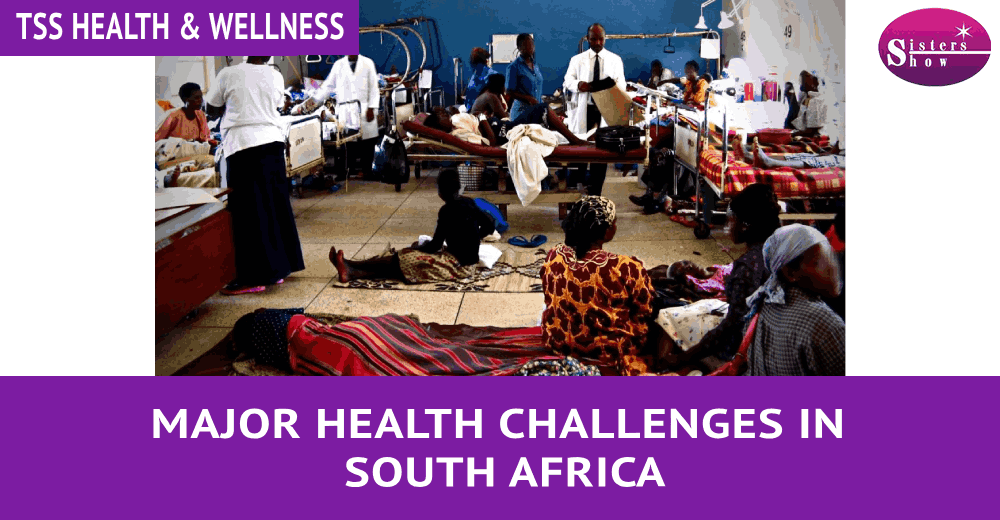
MAJOR HEALTH CHALLENGES IN SOUTH AFRICA
South Africa faces significant challenges in its healthcare sector, with both communicable and non-communicable diseases creating a heavy burden on the population. From widespread illnesses like tuberculosis and HIV/AIDS to lifestyle-related conditions such as diabetes and hypertension, these health issues highlight the pressing need for improved public health initiatives and access to care. Let’s take a closer look at the top health challenges affecting South Africans today.
1. Tuberculosis (TB)
Tuberculosis remains the leading health issue in South Africa and the primary cause of death. This bacterial infection typically affects the lungs but can spread to other areas, such as the brain or spine, if untreated. TB is closely linked to HIV/AIDS, as weakened immune systems allow latent TB to become active.
Key Facts about TB:
- In 2018, approximately 300,000 South Africans were infected, with over 63,000 deaths reported.
- KwaZulu-Natal has the highest TB prevalence, with over 700 cases per 100,000 people.
Types of Tuberculosis:
- Latent TB: The bacteria remain inactive and cause no symptoms but can become active if immunity decreases.
- Active TB: Symptoms such as persistent cough, chest pain, and fatigue occur as the bacteria multiply.
2. Diabetes
Diabetes is the second leading cause of death in South Africa, with around 4.5 million people affected. It’s a metabolic disorder that results in high blood sugar levels, either because the body doesn’t produce enough insulin or cannot use it effectively.
Types of Diabetes:
- Type 1 Diabetes: Typically diagnosed in children; requires insulin treatment.
- Type 2 Diabetes: Develops gradually in adults and is more common.
Symptoms to Watch:
- Excessive thirst and frequent urination
- Blurred vision and slow-healing wounds
- Constant fatigue and unexplained weight loss
3. Cardiovascular Diseases (CVD)
CVD, which includes heart diseases and strokes, ranks as the third highest cause of death in South Africa. An estimated 200 people die daily from CVD, highlighting the urgent need for preventive care.
Common Types of CVD:
- Coronary heart disease
- Stroke
- Arrhythmia (irregular heartbeat)
- Congenital heart disease
To reduce the risk, maintaining a healthy lifestyle with balanced nutrition and regular exercise is essential.
4. Cerebrovascular Disease
Cerebrovascular diseases, like strokes and aneurysms, occur when the blood supply to the brain is disrupted. These conditions can result in severe disability or death if not treated immediately.
Signs of a Stroke:
- Paralysis or numbness, usually on one side of the body
- Difficulty speaking or slurred speech
- Blurred vision or sudden loss of vision
- Sudden, severe headaches
5. HIV/AIDS
South Africa has one of the world’s highest rates of HIV/AIDS, with 7.7 million people living with the virus. Women aged 15–24 years are particularly affected, making up 63% of new infections.
Prevention and Treatment:
- Antiretroviral therapy (ART) reduces viral loads and helps prevent transmission.
- Regular HIV testing and safe practices can significantly lower infection risks.
6. Hypertensive Diseases
High blood pressure, or hypertension, affects nearly half of South African adults over 15 years old. If left untreated, hypertension can lead to severe complications, including heart attacks, strokes, and chronic kidney disease.
Symptoms and Risks:
- Headaches, chest pain, and shortness of breath
- Increased risk of dementia and eye problems
7. Influenza and Pneumonia
Influenza is a seasonal viral infection, while pneumonia is a bacterial, viral, or fungal infection that inflames the lungs. Both can be life-threatening, especially for infants, the elderly, and those with compromised immune systems.
Key Symptoms:
- For influenza: Fever, chills, sore throat, and dry cough
- For pneumonia: Chest pain, coughing with phlegm, and difficulty breathing
Staying Healthy and Protected
Addressing these health challenges requires individual and systemic action. Regular health check-ups, vaccinations, and early treatment for chronic conditions are vital steps toward a healthier population. Having access to affordable and comprehensive health insurance can also make a significant difference.
Taking charge of your health is essential, whether it’s by managing chronic illnesses like diabetes or preventing infections such as TB and HIV. Together, South Africans can work towards a healthier future by making informed choices and seeking timely medical care.
Don’t miss out on the latest updates. Stay updated with Health & Wellness with The Sisters Show. Get all the details and never miss a beat!
Read More: 5 FITNESS TRENDS THAT TOOK OVER SOUTH AFRICA IN 2024




